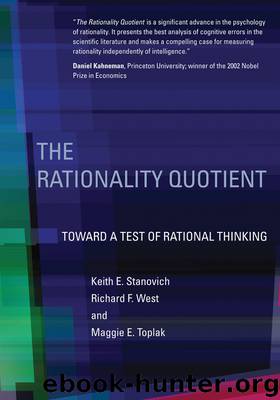The Rationality Quotient by Keith E. Stanovich & Richard F. West & Maggie E. Toplak

Author:Keith E. Stanovich & Richard F. West & Maggie E. Toplak
Language: eng
Format: epub
Publisher: The MIT Press
Published: 2016-09-07T04:00:00+00:00
Biases 3 and 4 are the fundamental computational biases that relate to conspiratorial ideation. The former bias (3), in the case of conspiratorial ideation, is just intentionality overextended in a different way—in the case of conspiracies, to unseen entities.
It is clear why we would expect a linkage between conspiratorial ideation and the Antiscience Attitudes subtest. Scientific attitudes are System 2 products (Stanovich, 2004) that are good at uncovering System 1 defaults that should be overridden. Likewise, supernatural thinking of the type assessed in our Superstitious Thinking subtest would appear to derive from the same fundamental computational biases that Oliver and Wood (2014) posit as central to conspiratorial ideation. Thus, we would expect some positive association between all three of the subtests discussed thus far in this chapter.
There are twenty-four items on the Conspiracy Beliefs subtest of the CART (see the appendix for sample items). We drew on a large number of conspiracies studied in the literature (Goertzel, 1994; Lewandowsky, Oberauer, & Gignac, 2013; Oliver & Wood, 2014), and added a few new ones of our own. Our subtest covered a wide range of conspiratorial beliefs. Most importantly, it covered conspiracies of both the political left and political right. Unlike some previous measures, it was not just a proxy for political attitudes (see Brandt et al., 2015; Chambers, Schlenker, & Collisson, 2013; Kahan, 2013; Oliver & Wood, 2015). Some of the commonly studied conspiracies that we assessed were: the assassination of President John F. Kennedy, the 9/11 attacks, fluoridation, the moon landing, pharmaceutical industry plots, the spread of AIDS, oil industry plots, and Federal Reserve conspiracies.
The response scale that was described above was used for this subtest as well. Like the Antiscience Attitudes subtest, the items on the Conspiracy Beliefs subtest were all presented together. Five extra items were included that actually did involve collusion on the part of corporations and government. We will call these the “justified beliefs” items. Subjects who were simply adopting a strategy of strongly denying conspiracies for reasons of impression management would score unusually low on these five items.
This subtest was run in the laboratory study mentioned above that involved 377 university students (RT57). Three subjects answered all five of the justified beliefs items “disagree strongly” and also answered at least 22 of 24 target conspiracy items the same way. These three subjects were removed from subsequent analyses involving this subtest, because they seemed to have developed an unthoughtful response set for the entire subtest. The mean total score of the remaining 374 subjects on the 24 target conspiracy items was 58.6 (SD = 17.5). This represents an average score of 2.44 on each of the individual conspiracies, which is a response scale location in the middle of “disagree moderately” and “disagree slightly.” The mean total score on the five justified beliefs items was 18.7 (SD = 3.7). This represents an average score of 3.73 on each of the justified beliefs items, which is a response scale location in the middle of “agree slightly” and “disagree
Download
This site does not store any files on its server. We only index and link to content provided by other sites. Please contact the content providers to delete copyright contents if any and email us, we'll remove relevant links or contents immediately.
| Administration & Medicine Economics | Allied Health Professions |
| Basic Sciences | Dentistry |
| History | Medical Informatics |
| Medicine | Nursing |
| Pharmacology | Psychology |
| Research | Veterinary Medicine |
The Art of Thinking Clearly by Rolf Dobelli(10450)
The 5 Love Languages: The Secret to Love That Lasts by Gary Chapman(9784)
Mindhunter: Inside the FBI's Elite Serial Crime Unit by John E. Douglas & Mark Olshaker(9317)
Becoming Supernatural by Dr. Joe Dispenza(8199)
Nudge - Improving Decisions about Health, Wealth, and Happiness by Thaler Sunstein(7689)
The Road Less Traveled by M. Scott Peck(7592)
Mastermind: How to Think Like Sherlock Holmes by Maria Konnikova(7320)
Enlightenment Now: The Case for Reason, Science, Humanism, and Progress by Steven Pinker(7306)
Win Bigly by Scott Adams(7183)
The Way of Zen by Alan W. Watts(6600)
Factfulness: Ten Reasons We're Wrong About the World – and Why Things Are Better Than You Think by Hans Rosling(4731)
The State of Affairs by Esther Perel(4711)
Gerald's Game by Stephen King(4641)
Man's Search for Meaning by Viktor Frankl(4579)
The Confidence Code by Katty Kay(4251)
Thinking in Bets by Annie Duke(4218)
The Healing Self by Deepak Chopra(3568)
Hidden Persuasion: 33 psychological influence techniques in advertising by Marc Andrews & Matthijs van Leeuwen & Rick van Baaren(3551)
The Worm at the Core by Sheldon Solomon(3484)
